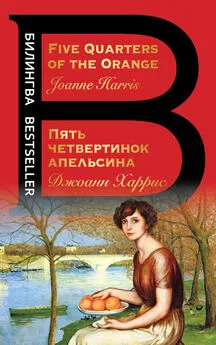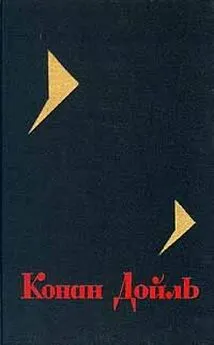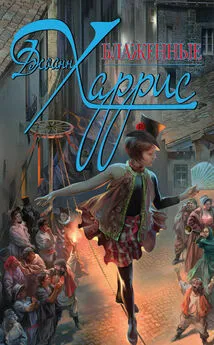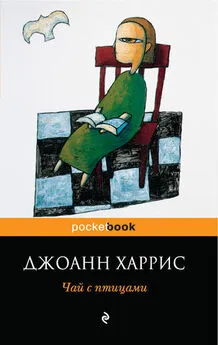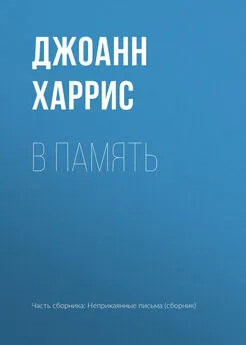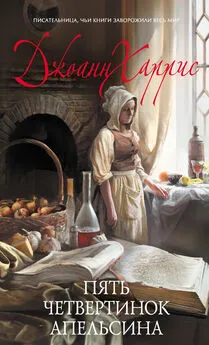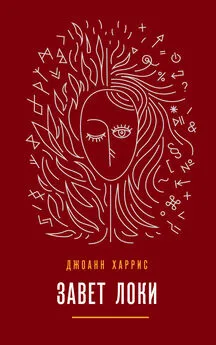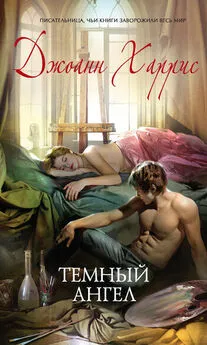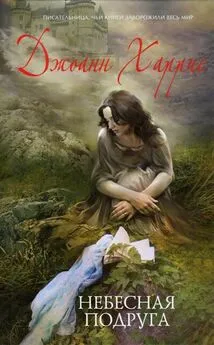Джоанн Харрис - Five Quarters of the Orange / Пять четвертинок апельсина
- Название:Five Quarters of the Orange / Пять четвертинок апельсина
- Автор:
- Жанр:
- Издательство:неизвестно
- Год:2022
- Город:Москва
- ISBN:978-5-04-163417-9
- Рейтинг:
- Избранное:Добавить в избранное
-
Отзывы:
-
Ваша оценка:
Джоанн Харрис - Five Quarters of the Orange / Пять четвертинок апельсина краткое содержание
Оригинальный текст и перевод на страницах одной книги – это эффективный способ усовершенствовать знание английского языка.
От матери в наследство Фрамбуаза получила альбом с кулинарными рецептами – негусто, если учесть, что ее брату Кассису досталась ферма, а старшей сестре Рен-Клод – винный погреб со всем содержимым. Но весь фокус в том, что на полях альбома, рядом с рецептами разных блюд и травяных снадобий, мать записывала свои мысли и признания относительно некоторых событий ее жизни – словом, вела своеобразный дневник. И в этом дневнике Фрамбуаза пытается найти ответы на мрачные загадки прошлого.
«Харрис создала многослойный сюжет, усыпанный восхитительными описаниями французских книг и раскрывающий встряхивающий эффект войны на хрупкое семейное устройство». – Publishers Weekly
«Из ее книг эта – пока самая сильная: острая, с горчинкой…» – Independent
В формате PDF A4 сохранен издательский макет.
Five Quarters of the Orange / Пять четвертинок апельсина - читать онлайн бесплатно ознакомительный отрывок
Интервал:
Закладка:
“She does things,” said my father. “Things she doesn’t really remember afterward. Because of the bad spells.”
We stared at him solemnly. Bad spells.
My youthful mind associated the phrase with stories of witches. The gingerbread house. The Seven Swans. I imagined my mother lying on her bed in the dark, eyes open, strange words sliding between her lips like eels. I imagined her looking through the walls and seeing me, seeing right inside me and rocking with that dreadful, yarking laughter… Sometimes Father slept on the kitchen chair when Mother had her bad spells. And one morning we had got up to find him bathing his forehead in the kitchen sink, and the water full of blood… An accident, he told us then. A stupid accident. But I remember seeing blood, glossy on the clean terra-cotta tiles. A length of stove wood had been left on the table. There was blood on that too.
“She wouldn’t hurt us, would she, Papa?”
He looked at me for a moment. A second’s hesitation, maybe two. And in his eyes a look of calculation, as if deciding how much to tell.
Then he smiled. “Of course not, sweetheart.” What a question, his smile said.
“She wouldn’t ever hurt you.”
And he folded me into his arms and I smelled tobacco and moths and the biscuity smell of old sweat. But I never forgot that hesitation, that measuring look. For a second he had considered it. Turned it over in his mind, wondering how much to tell us. Perhaps he’d thought that he had time, plenty of time to explain to us when we were older.
Later that night I heard sounds from my parents’ room; shouting, breaking glass. I got up early to find that my father had slept all night in the kitchen. My mother got up late but cheery-as cheery as she ever was-singing to herself in a low tuneless voice as she stirred green tomatoes into her round copper jamming pan, slipping me a handful of yellow gages from her apron pocket. Shyly, I asked her if she felt any better. She looked at me without comprehension, her face white and blank as a clean plate. I sneaked into her room later and found my father taping waxed paper over a broken windowpane. There was glass on the floor from the window and the face of the mantel clock, now lying face-down on the boards. A reddish smear had dried against the wallpaper just above the bedstead, and my eyes sought it with a kind of fascination. I could see the five commas of her fingertips where they had stabbed at the paper, and the blot that was her palm. When I looked again a few hours later, the wall had been scrubbed clean and the room was tidy again. Neither of my parents mentioned the incident, both behaving as if nothing untoward had happened. But after that, my father kept our bedroom door locked and our windows bolted at night, almost as if he were afraid of something breaking in.
7
When my father died I felt little true grief. When I looked for sorrow I found only a hard place inside myself, like a stone in a fruit. I tried to tell myself that I would never see his face again, but by that time I had almost forgotten it as it was. Instead he had become a kind of icon, rolling eyes like a plaster saint’s, his uniform buttons gleaming mellowly. I tried to imagine him lying dead on the battlefield, lying broken in some mass grave, exploded by the mine that blew up in his face… I imagined horrors, but they were unreal to me as nightmares. Cassis took it worst. He ran away for two days after we got the news, finally returning exhausted, hungry and covered in mosquito bites. He’d been sleeping out on the other side of the Loire, where the woods tail off into marshland. I think he’d had some mad idea of joining the army, but had got lost instead, going round in circles for hours until he’d found the Loire again. He tried to bluff it out, to pretend he’d had adventures, but for once I didn’t believe him.
After that he took to fighting other boys, and often came home with torn clothes and blood under his fingernails. He spent hours in the woods alone. He never cried for Father, and took pride in that, even swearing at Philippe Hourias when he once tried to offer comfort. Reinette, on the other hand, seemed to enjoy the attention Father’s death brought her. People called round with presents, or patted her head if they met her in the village. In the café the matter of our future-and our mother’s-was discussed in low, earnest voices. My sister learned to make her eyes brim at will, and cultivated a brave, orphaned smile that earned her gifts of sweets and the reputation of being the sensitive one in the family.
My mother never spoke of him after his death. It was as if Father had never lived with us at all. The farm went on without him, if anything with even greater efficiency than before. We dug up the rows of Jerusalem artichokes, which only he had liked, and replaced them with asparagus and purple broccoli, which swayed and whispered in the wind. I began to have bad dreams in which I was lying underground, rotting, overwhelmed by the stench of my own decay. I drowned in the Loire, feeling the ooze of the riverbed crawl over my dead flesh, and when I reached out for help I felt hundreds of other bodies there with me, rocking gently with the undercurrent, crammed shoulder to shoulder against one another, some whole, some in pieces, faceless, grinning brokenly from dislocated jaws and rolling dead eyes in garish welcome… I awoke from these dreams sweating and screaming, but Mother never came. Instead Cassis and Reine came to me, impatient and kind by turns. Sometimes they pinched and threatened me in low, exasperated voices. Sometimes they took me in their arms and rocked me back to sleep. Sometimes Cassis would tell stories and Reine-Claude and I would both listen, eyes wide in the moonlight; stories of giants and witches and man-eating roses and mountains and dragons masquerading as men… Oh, Cassis was a fine storyteller in those days, and though he was sometimes unkind and often made fun of my night terrors, it is the stories I remember most now, and his eyes shining.
8
With Father gone, we grew to know Mother’s bad spells almost as well as he had. As they began she would speak with a certain vagueness, and she would suffer tension around the temples, which she would betray by impatient little pecking movements of the head. Sometimes she would reach for something-a spoon, a knife-and miss, slapping her hand repeatedly against the table or the sink top as if feeling for the object. Sometimes she would ask, “What’s the time?” even though the big round kitchen clock was just in front of her. And always at these times, the same sharp, suspicious question:
“Has any of you brought oranges into the house?”
We shook our heads silently. Oranges were scarce; we’d only tasted them occasionally. On the market in Angers we might see them sometimes: fat Spanish oranges with their thick dimpled rind; finer-grained blood oranges from the South, cut open to reveal their grazed purple flesh… Our mother always kept away from these stalls, as if the sight of them sickened her. Once, when a friendly woman at the market gave us an orange to share, our mother refused to let us into the house until we had washed, scrubbed under our nails and rubbed our hands with lemon balm and lavender, even then claimed she could smell the orange oil on us-left the windows open for two days until it finally vanished. Of course, the oranges of her bad spells were purely imaginary. The scent heralded her migraines, and within hours she was lying in darkness with a lavender-soaked handkerchief across her face and her pills to hand beside her. The pills, I later learned, were morphine.
She never explained. What information we gleaned was gathered from long observation. When she felt a migraine approaching she simply withdrew to her room without giving any reason, leaving us to our own devices. So it was that we viewed these spells of hers as a kind of holiday-lasting from a couple of hours to a whole day or even two-during which we ran wild. They were wonderful days for us, days that I wished would last forever, swimming in the Loire or catching crayfish in the shallows, exploring the woods, making ourselves sick with cherries or plums or green gooseberries, fighting, sniping at one another with potato rifles and decorating the Standing Stones with the spoils of our adventuring.
The Standing Stones were the remains of an old jetty, long since swept away by the currents. Five stone pillars, one shorter than the rest, protruding from the water. A metal staple stuck out from the side of each, bleeding tears of rust into the rotten stone, where boards had once been fixed. It was on these metal protrusions that we hung our trophies; barbaric garlands of fish heads and flowers, signs lettered in secret codes, magical stones, driftwood sculptures. The last pillar stood well into the deep water at a point where the current was especially strong, and it was here we hid our treasure chest. This was a tin box wrapped in oilcloth and weighted with a piece of chain. The chain was secured to a rope, which in its turn was tied to the pillar we all referred to as the Treasure Stone. To retrieve the treasure it was necessary first to swim to the last pillar-no mean feat-then, holding on to the pillar with one arm, to haul up the sunken chest, detach it and swim with it back to the shore. It was accepted that only Cassis could do this. The “treasure” consisted mainly of things no adult would recognize as being of value. The potato guns. Chewing gum, wrapped in greased paper to make it last. A stick of barley sugar. Three cigarettes. Some coins in a battered purse. Actresses’ photographs (these, like the cigarettes, belonged to Cassis). A few issues of an illustrated magazine specializing in lurid stories.
Sometimes Paul Hourias came with us on what Cassis called our “hunting trips,” though he was never fully initiated into our secrets. I liked Paul. His father, Jean-Marc, sold bait on the Angers road and his mother took in mending to make ends meet. He was an only child of parents old enough to be his grandparents, and much of his time was spent keeping out of their way. He lived as I longed to live; in summer he spent whole nights out in the woods without arousing any concern from his family. He knew where to find mushrooms on the forest floor and to make whistles out of willow twigs. His hands were deft and clever, but he was often awkward and slow in speech, and when adults were near he stuttered. Though he was close to Cassis’s age, he did not go to school, but helped instead on his uncle’s farm, milking the cows and bringing them to and from the pasture. He was patient with me too, more so than Cassis, never making fun of my ignorance or scorning me because I was small. Of course, he’s old now. But I sometimes think that of the four of us, he is the one who has aged the least.
Part Two
Forbidden fruit
1
It was already, in early June, promising to be a hot summer and the Loire was low and surly with quicksand and landslides. There were snakes too, more than usual, flat-headed brown adders that lurked in the cool mud in the shallows. Jeannette Gaudin was bitten by one of these as she paddled one dry afternoon, and they buried her a week later in Saint-Benedict’s churchyard, beneath a little plaster cross and an angel. Beloved Daughter…1934–1942. I was a year older than she was.
Suddenly I felt as if a gulf had opened beneath me, a hot, deep hole like a giant mouth. If Jeannette could die, then so could I. So could anyone. Cassis looked down from the height of his fourteen years in some scorn: “You expect people to die in wartime, stupid. Children too. People die all the time.”
Читать дальшеИнтервал:
Закладка:
